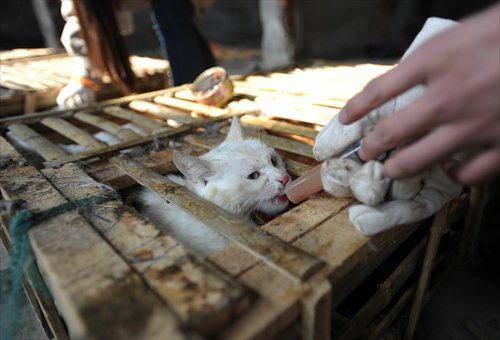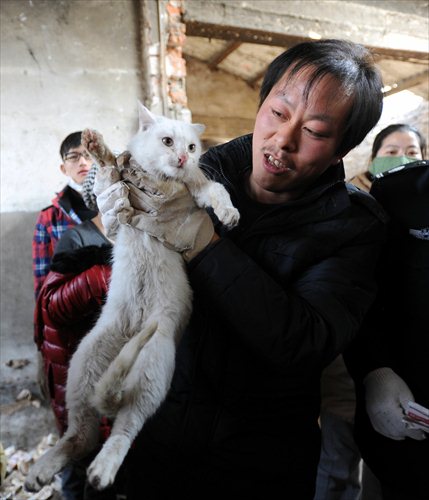HOME >> METRO SHANGHAI
Animal activists’ highway truck stop reveals illegal trafficking gang
Source:Global Times Published: 2016/7/13 18:23:04

Two snatched cats peer out from the wooden cages. Photo: IC
Illegal animal trafficking remains a problem in China despite repeated attempts to ban it. A few days ago, two animal lovers stopped a truck being driven from Shanghai to Suzhou, Jiangsu Province at an expressway tollgate in the Xiangcheng district of Suzhou, reported the Youth Daily.
More than 300 cats were saved and are now being looked after by the Suzhou Small Animal Protection Association.
The cat traffickers were arrested by police, who soon unraveled a surprising underground chain of illegal cat trading. These cat traders were earning an average 100,000 yuan ($14,925) a month. The workers at the bottom of the chain, the cat catchers, were making at least 10,000 yuan monthly.
Headquarters nearby
Miss Zhang (pseudonym) was one of the two animal lovers involved in the cat rescue. After stopping the trafficking truck, they confronted the cat traffickers who quickly summoned another 20 gang members to the scene. It turned out that the gang's headquarters was located in Jinguang village in Suzhou, which is very close to the Xiangcheng expressway tollgate. However traffic police on duty at the tollgate made sure Zhang and her friend were not hurt by the gang.
Zhang said most of the cats stolen by the gang did not have proper certification and this was why the police could arrest them. Zhang, who is a volunteer with an animal protection group, has had quite a lot of experience in stopping cat trucks.
She said these trucks were easy to spot - they are usually stacked with cages covered with black material but there are always some parts not covered so that the animals can breathe. In other cat rescues, several of the trucks stopped had the same number plates.
"The gangs surrendered their cats quickly and easily because they knew this was against the law. But because there is a lack of legal enforcement, the gang members have never been punished appropriately," Zhang said.
She said stopping cat trucks on expressways was one of the few ways they could save cats because of the restrictions of the legal system. In China the law does not forbid cat trading as such but insists that any live animals being transported on an expressway have to have proper identification and certification.

A volunteer feeds a cat after rescuing it from the cat traffickers. Photo: IC
Maintaining traditions
Cat traffickers are active in Shanghai as well as Suzhou and Rugao in Jiangsu Province. A Suzhou native surnamed Wang, who carries on his father's business and trades cats in Jinguang village, is one of the biggest cat suppliers in the region. His gang steals cats from suburban areas and transports them to Guizhou, Guangdong provinces and the Guangxi Zhuang Autonomous Region where local people maintain their traditions and eat dog and cat meat. Sometimes the cats are exported to Cambodia, Laos and Vietnam.
Using cages with sparrows as bait, the traffickers could capture several cats in a day. The journey on the expressways usually took some 30 hours, during which the cats were not fed or given water. On hot days in summer, drivers would douse the cats with water every so often to stop them dying of dehydration - dead cats are worth nothing. By the time they reached their destination many of the cats were obviously sick but that didn't matter to the cat traffickers. Every live cat was worth something. After the deals were done the cats were slaughtered and the meat delivered to restaurants.
According to an insider, cat trafficking is very profitable because it involves hardly any expenses. "The most successful cat supplier earns 100,000 yuan a month. Even workers catching cats and sparrows earn 10,000 yuan a month." The insider said that this particular chain had existed for more than 30 years.
Most of the people who buy cats are in Guangdong Province where they collect the cats and slaughter them on the spot before selling the meat to restaurants.

A man holds one of the saved cats at a temporary shelter. Photo: IC
Unlicensed and dirty
"It's not just that the cats don't go through health inspection and quarantine, but the slaughtering areas are mostly unlicensed and dirty. Putting cat meat like this on dining tables is unsafe."
Ma Zhiying, the director of the Food Safety Committee of the Shanghai Society of Food Science, said that China had strict regulations on food safety for livestock and poultry. "Cat meat, with its potential for carrying parasites and spreading infectious diseases, is not listed among the meats authorized by the China Food and Drug Administration," Ma said. "As well, food safety problems exist during the cat transportation and slaughtering processes."
Other food safety experts have suggested people stop eating cat meat. Unlike pork, beef or chicken, which come from animals especially raised for meat production, the cat meat served in restaurants comes from stray cats or household cats which live on leftovers, raw fish or rodents. It is highly likely that these cats carry parasites which cannot be destroyed even in high temperatures. People who eat this meat can be infected easily. And there are no legal standards for cat meat inspection, which makes it even riskier.
The Youth Daily has learned that while Macao introduced an animal protection law in 2014, there is still no law protecting animals in general in the Chinese mainland. Existing laws only safeguard endangered wildlife. Lawyer Huang Rongnan explained why China was slow at implementing legislation to protect animals.
Limited resources
First, legal resources are limited and that was why rare and endangered wildlife became a priority. Second, it's easier to legislate than enforce laws. There are huge numbers of livestock and poultry and it would require a great deal of manpower and energy to enforce these laws adequately. A special government department would need to be established to support the legislation, and this could not be achieved overnight.
Third, any legislation should take into account culture and customs. In some regions of China, eating dog and cat meat is a tradition. If the government issues a law forbidding the eating of dog and cat meat forever, their culture and dining styles will be damaged.
Huang added that although the unlicensed trafficking and slaughtering of cats was illegal, he didn't agree with cat lovers stopping trucks on highways. "It is very dangerous. Forcing big trucks to stop while they are traveling at speed could cause serious accidents," Huang said. "And many animal lovers abuse and assault the drivers for transporting the cats, but the drivers are just doing their job. What we should do is put an end to the chain by stopping illegal cat and dog snatches in the first place."
Huang suggested citizens report unscrupulous gangs to relevant departments instead of taking risky measures by themselves. "And people should report stores and restaurants buying illegal meat. In line with the Food Safety Law of the People's Republic of China, health and quarantine departments have the right to investigate suspicious food deals and issue penalties."
Compiled by Gu Qianwen based on an article from the Youth Daily
Newspaper headline: The cat’s out of the bag!
Posted in: Metro Shanghai, City Panorama